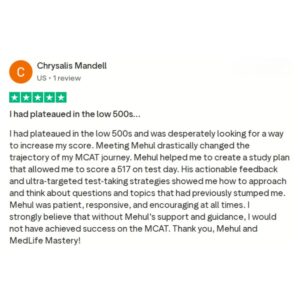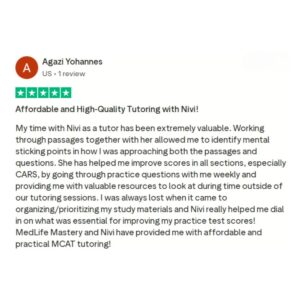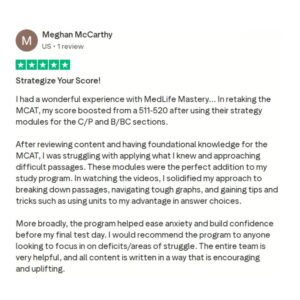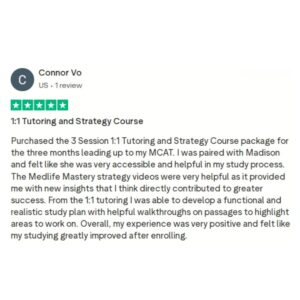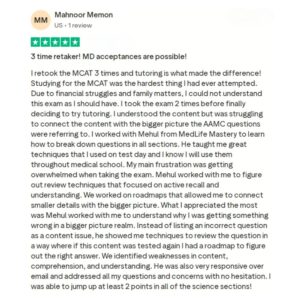Get a 90+ percentile MCAT scorer to keep you on track and make sure you hit your score goal →
Did you know that taking MCAT practice examinations on a regular basis can increase a student's score by up to 10 points? The Association of American Medical Colleges (AAMC), which has observed students make enormous progress simply by utilizing these assessments wisely, supports that number, which is not some arbitrary one. So, if you’re serious about getting into med school, practice exams should be your best friend.
The MCAT is a beast of an exam—long, intense, and challenging. But with the right tools, like practice tests, you don’t have to feel lost. In this blog, we’ll walk through how to use these tests to do more than just assess what you know. They help you build stamina, improve your reasoning skills, and ultimately set you up to crush the MCAT when it counts.
Why Practice Exams Are More Than Just a Knowledge Test
A lot of people think practice exams are just there to show you how much you’ve studied. They couldn’t be more wrong. Practice tests are more than a score—they train your brain to handle the marathon-like intensity of the actual MCAT.
Test Stamina: Training Your Brain for a Long Test
Sitting still and focusing for seven hours is no joke. Most people don’t regularly do that, so when test day comes, it’s like running a marathon without ever training. Practice exams, though, help you build that mental endurance, which is key.
Start with shorter focus sessions—30 minutes, an hour—until your brain gets used to it. Then, as you progress, tackle full-length exams to train yourself for the real thing. Each time, you’ll notice that you can focus longer and stay sharper.
This kind of mental stamina doesn’t come overnight, but it’s crucial for test day. The MCAT demands energy not just in hour one but all the way through to hour seven. By practicing with full-length tests, you’re conditioning your brain to stay strong, focused, and on task throughout.How to Ease Into Full-Length MCAT Practice Tests
Let’s face it—taking a full-length practice test on your first try feels overwhelming. You don’t need to leap into the deep end right away. Just like you don’t run a marathon before jogging a few miles, you should ease into MCAT practice tests.
Start by breaking up the test into sections. Take one part in the morning, another in the afternoon. As you build up your mental stamina, you can start taking more of the test in one sitting until you can comfortably handle the entire exam.
This approach lets you build confidence without burning out. You’re giving your brain a chance to adjust to the marathon-like nature of the test without stressing yourself out. When you finally take the full exam in one go, it’ll feel like just another practice run—no big deal.
Boost Your Knowledge: Practice Exams Teach You More Than You Think
Most students wait to take practice exams until they feel like they’ve mastered the content. Big mistake. Practice exams are a powerful tool for building knowledge, not just testing it.
Build Knowledge, Not Just Confidence
Every time you take a practice exam, it reveals the gaps in your understanding. It shows you exactly what you don’t know. And that’s golden because it directs your study time to the areas that matter most.
Write down the questions that stumped you or topics that left you scratching your head. You now have a custom-made study guide. Every time you go back to review those weak areas, you’re filling in knowledge gaps and becoming more prepared for test day.
Over time, you’ll notice fewer and fewer weak spots as your understanding deepens. The practice exams teach you by showing you where to focus. The more you learn from them, the closer you get to feeling confident in every section.
Active Recall: The Key to Improving Memory
The truth is that knowledge does not always stick to the reader once it is read. Active recall helps with this process since you have to actively retrieve it from your memory. Every time you respond to a practice question, you're making your brain work harder to remember the answers.
This strengthens your recall ability and prepares you to pull that same information when you need it during the real MCAT. Miss a question? No worries. That’s an opportunity to reinforce the concept so next time you nail it.
Even the questions you get right can be learning moments. Don’t breeze past them. Review what worked in your thought process so you can replicate that success next time.
Useful Advice: How to Make a Custom Study Guide
Among the simplest methods for making a customized study guide? While you practice, make notes. During the test, take out a sheet of paper and write down any questions or subjects that you find difficult.
You will have almost built a personalized study plan by the time the test ends. There's no speculating on what to work on next. You’ll know exactly what needs your attention.
This method is efficient and practical. It saves you from wasting time on things you already know while focusing on what still needs work. With each practice test, you’re tightening up your weak areas, and over time, you’ll feel more and more prepared.
Pattern Recognition: Mastering the Art of Test-Taking
The MCAT isn’t just about content knowledge. It’s a game of recognizing patterns, knowing how the test presents information, and getting used to its tricky ways. The more practice exams you take, the better you get at spotting these patterns.
Reviewing Isn’t Just for Wrong Answers
Most people only review the questions they got wrong. But here’s a pro tip—review the ones you got right, too. When you do this, you’re understanding the why behind your success, not just your mistakes.
Knowing why you got a question right helps you replicate that process on future questions. Maybe you guessed correctly using elimination, or maybe your reasoning was spot on. Either way, understanding your successful strategies is just as important as correcting your errors.
By reviewing both correct and incorrect answers, you’re doubling your learning. You’re fine-tuning the skills that work and fixing what doesn’t. And when test day rolls around, you’ll be prepared for whatever comes your way.
The “Why” Behind Your Answers: A Game Changer
After each practice test, take time to figure out why you answered each question the way you did. Were you confident, or were you just lucky? Maybe you understood the content but misread the question.
Figuring out the "why" behind both right and wrong answers gives you insight into how your brain works under pressure. Maybe you find certain graphs confusing but excel at analyzing passages. This process helps you understand where you excel and where you need to adjust.
As you practice, you’ll start recognizing patterns in the questions, and you’ll know exactly how to approach similar problems in the future. Every MCAT question has a rhythm to it. Once you understand that rhythm, you’re golden.
Embrace Uncertainty: It's Normal on the MCAT
Nobody loves feeling uncertain, especially on something as high-stakes as the MCAT. But here’s the thing: uncertainty is baked into the test. The MCAT isn’t just checking if you know facts—it’s testing how you handle pressure and the unknown.
The MCAT is Like a Hike: Keep Moving Forward
Think of the MCAT like a long hike. You don’t need to know every twist and turn to complete it. You just need to trust the path and the process.
Practice exams teach you how to trust yourself even when you’re unsure. You might not have every answer, but you have the tools to figure things out. The more you practice, the better you get at moving forward despite the uncertainty.
The MCAT is designed to challenge you, but that doesn’t mean you can’t succeed. Half the battle is won when you accept that uncertainty and figure out how to move through it. Additionally, practice exams allow you to become accustomed to that sensation.
It's Acceptable to Answer Questions Wrong—Really
We understand that nobody likes making mistakes. However, incorrect responses are quite beneficial on practice examinations. They draw attention to the exact areas where you need to develop.
Rejection Is Not Rejection—It's Advancement
Every wrong answer acts as a kind of floodlight, drawing attention to the areas where you lack expertise. It's not a sign of failure, but a road map for where you need to go. Furthermore, what knowledge do you possess? You get stronger when you fortify your areas of weakness.
Don't let unanswered questions depress you. They offer opportunities for growth. You get closer to understanding an idea each time you tackle a difficult question and return to it later.
It resembles picking up a new skill. You don't become an expert at it right away. However, every error you make teaches you something, and eventually, those errors become assets. The same applies to the MCAT.Pay Attention to the Process Rather Than the Scores
It's simple to become obsessed with the figures. You want to see an increase in your practice scores, but it's important to remember that scores don't mean anything. Learning is the goal of practice exams, not merely memorizing facts.
The True Significance of Practice Exam Results
Naturally, everyone enjoys watching their score rise. It boosts your self-assurance. However, if you don't instantly achieve your goal or if the results of your practice test differ, don't worry.
Recall that Sarah's practice exams did not indicate that she would increase her MCAT score by ten points. Not simply the figures on the screen, but also the lessons gained during practice are what truly matter. Focus on how you’re growing and learning from each test—your final score will reflect that hard work.
The score comes easily when you focus on the process. Practice exams serve as more than just forecasts; they are instruments for growth. If you persevere, you will eventually realize the benefits.
Keep Practicing and Improving
With every practice test you take, you will come closer to the top of the MCAT, even though it may seem like an unclimbable mountain. You can get there with hard work, persistence, and consistency. It's not necessary to achieve perfection, but you must always keep going forward.
Put your attention toward studying, increasing your endurance, and honing your problem-solving abilities. You get better at both the material and the necessary mental toughness with each exam. You'll be prepared to ace the test on day one.
Practice exams are your greatest resource for preparation—they're not simply for drills. You'll feel like a pro when you enter the exam room if you stick with them and have faith in the procedure.
The MedLife Mastery Team
Your Med-School Mentors





 To help you achieve your goal MCAT score, we take turns hosting these
To help you achieve your goal MCAT score, we take turns hosting these 

